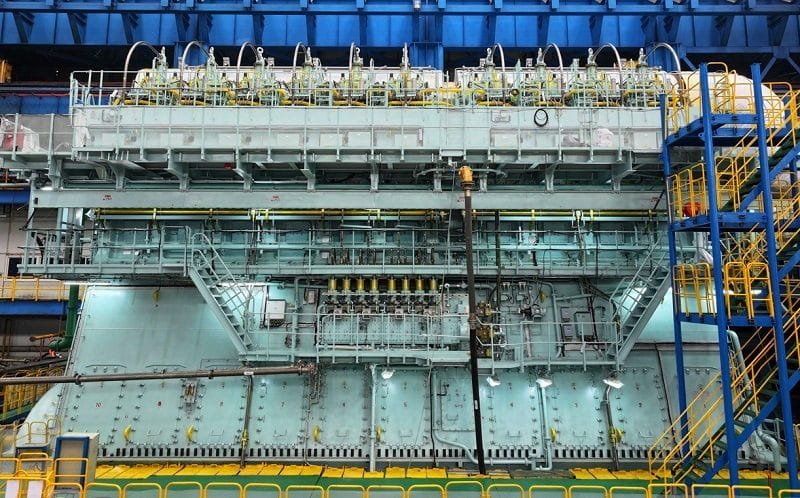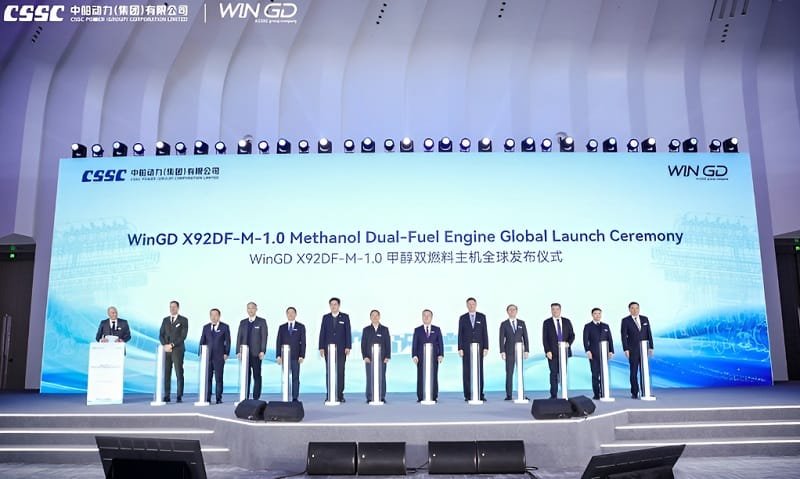WinGD, a leading Swiss marine power company, has unveiled its groundbreaking X-DF-M platform, which includes the largest methanol-fuelled engine ever built. The ten-cylinder, 92-bore X-DF-M engine recently passed both factory and type approval tests, marking a significant milestone in the evolution of sustainable marine propulsion. The engine is set to be delivered to the shipyard and will power a 16,000 TEU container ship, setting a new standard for methanol-powered engines.
This development is a key addition to WinGD’s extensive engine portfolio, which already includes the well-established X-DF LNG-fuelled engine platform and the emerging X-DF-A ammonia-fuelled engine platform. With 56 X-DF-M engines currently on order across various bore sizes—from 52 to 92 mm—the platform offers deep-sea ship operators a wider range of decarbonisation options. The new methanol-capable engine is designed to work seamlessly with different fuel types, extending WinGD’s commitment to providing efficient, reliable solutions for the energy transition in shipping.
Table of Contents
Commitment to Maritime Decarbonisation
“Production of sustainable, renewable fuels of all types continues to advance, but long-term availability and cost remain uncertain. Ship operators can place their trust in WinGD to deliver reliable, efficient engine designs that enable decarbonisation across all candidate fuels. As interest in methanol and regulatory clarity increases, we anticipate the X-DF-M platform will become a key contributor to reducing greenhouse gas emissions from global shipping,” said Dominik Schneiter, CEO of WinGD.
The X-DF-M engine’s debut highlights the growing role of methanol in reducing shipping’s carbon footprint. Methanol, much like LNG, can be produced with low carbon emissions by utilizing renewable energy sources or biomass, alongside captured carbon. As a result, the methanol-fuelled X-DF-M platform becomes a critical part of WinGD’s broader strategy to support maritime decarbonisation.

Celebrating a Milestone
The milestone was officially celebrated during a delivery ceremony held at engine builder CMD’s facilities in Shanghai. The event was attended by senior executives from WinGD, CMD, China State Shipbuilding Corporation (CSSC), as well as local government officials and a number of global customers and partners. Eight classification societies were also present for the signing of the X-DF-M type approval certification, confirming that the engine can be built to WinGD’s specifications by any certified engine builder.
A representative from CMD commented, “It is a big responsibility to build the first engine of any type, especially one for an emerging fuel like methanol. Our debut methanol-fuelled engine performed as expected across all tests, and we look forward to offering the X-DF-M platform as a new option for shipbuilders.”
Further Advancements and Methanol Conversion Packages
As previously reported, the first X-DF-M engine will be installed on the fourth vessel of a new series. The first three vessels in the series are equipped with WinGD’s 10X92-B engines, which will be converted to 10X92DF-M engines once the first new methanol-powered engine is commissioned. WinGD will also offer dual-fuel methanol conversion packages for all existing single-fuel and dual-fuel engines, ensuring flexibility for ship owners looking to transition to more sustainable fuel sources.
Looking Toward the Future
The future of shipping’s energy transition will rely heavily on the continued development of low- and zero-carbon fuels, with methanol playing a pivotal role alongside other emerging alternatives such as green ammonia and e-diesel. WinGD’s X-DF-M engine platform, with its versatility in supporting multiple fuel types, positions the company as a leading innovator in driving the maritime industry’s shift towards sustainability.
About WinGD
WinGD (Winterthur Gas & Diesel) is a global leader in marine power solutions, advancing the decarbonisation of marine transportation through sustainable energy systems. The company offers cutting-edge technologies in emissions reduction, fuel efficiency, hybridisation, and digital optimisation. WinGD’s two-stroke low-speed engines set the industry standard for reliability, safety, and environmental design. Based in Winterthur, Switzerland, WinGD has been at the forefront of marine engine technology since its inception in 1893 and continues to lead the way in transforming the maritime industry towards a more sustainable future. WinGD is a member of the CSSC Group.
Source Winterthur Gas & Diesel

